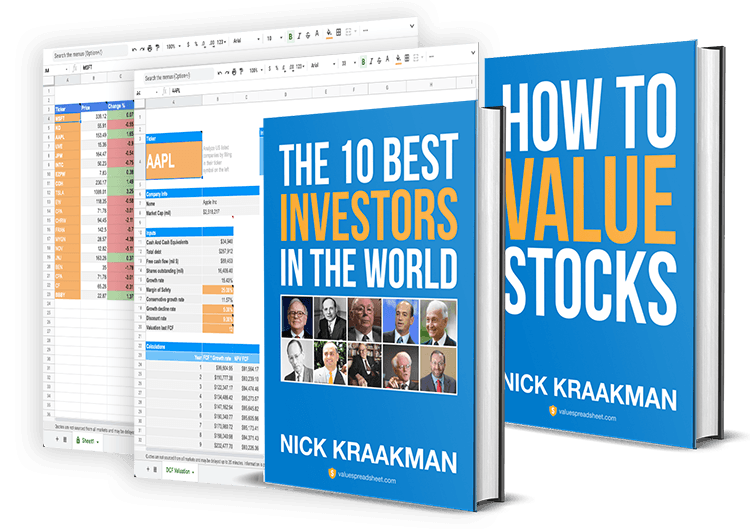Transcript
Hello, everyone, welcome back to the Value Investing Bootcamp podcast.
I'm your host, Nick Kraakman.
I'm recording this podcast from my hometown, Amsterdam.
Yes, we do have the red light district, and yes, we do have a lot of legal weed over here, but trust me, that's more for the tourists.
Amsterdam is a beautiful city, so whenever you're in the neighborhood, definitely visit.
Really, I love it so much. I've seen a lot of the world, but I always come back to Amsterdam. That's really where my heart is.
Well, in today's episode, what we'll talk about is how you can fire your advisor, or if you don't have one, you don't need to hire one because you can do it yourself.
You can invest your own money because let's face it, who cares more about your money than yourself?
I mean, many theories about altruism also seem to point in the sober direction that even altruistic behavior is ultimately in your own self interest, because it makes you feel better.
But let's not go into that direction, let's focus on investing.
So, yeah, advisors, what are they?
They are guys, you can give them your money, and they will invest it for you, or they give you advice on which stocks to purchase and etc.
The problem with it is that your incentives are not aligned, because he isn't making money most of the time.
If he makes some money for you, he earns money for every trade that you make.
So, what this means is that he will try to get you to trade as often as possible.
But like I said, in my first story about how I started investing, transaction costs can really, really destroy your returns, so frequent trading is actually something which I do not recommend at all.
If I take myself as an example, I think I trade maybe once or twice every quarter, sometimes more, sometimes even less.
It just depends on how many interesting opportunities I find on my path.
And I mean, when you look at value investing as buying great companies at discount prices, you can imagine that when a company is great, when a company is earning a lot of money, it is not very often mispriced, it is not very often available for a cheap price.
This means that most of the time, you might not be able to find any investment opportunities at all which meet your criteria.
So, that's another reason why if you trade frequently, it probably means that your criteria are not strict enough, and you're probably buying some crap along the way.
But back to advisors, I mean, yeah, so they earn money from you trading a lot, as much as possible, because that means more fees for them.
But even if you have an advisor that is really acting in your best interest, trying to earn you as much money as possible, then still you might be better off investing on your own, because it's just a fact that, like the majority of fund managers and advisors and investing experts, whatever, they earn your only mediocre returns at best.
Again, you know, I mentioned the transaction cost if you trade frequently, but also if you have to pay these fees, and these commissions to advisors and fund managers, then this also really subtracts from your returns.
And even though you can say, oh but they’re just a few percentage points or just small amounts of money, they do add up.
And again, every bit of money that you lose sort of interferes with the compounding process, and even let's say, a 1% difference in return per year, can really accumulate over the years, it can make a massive, massive difference because compounding even at 1% difference, it can cost you thousands and thousands of dollars after a couple of years.
So, yeah, I just recommend you to stay away from advisors and fund managers, and just invest your own money as long as you are prepared to put some time and effort into learning about profitable investing, how the greatest investors in the world do it, because really, that is the single best way to invest your money over time, because it's a low risk strategy with the ability to earn you consistent above average returns.
But again, the only way to achieve this is to know what you're doing, and for this, you need to know the rules of the game, how to play it.
Tthat's why it's great that you're listening to this podcast, because I'm trying to teach you some of the stuff that I know that worked for me, that worked for all the greatest investors in the world, so it can work for you as well.
This whole do it yourself movement that is springing up around the world is a great, great thing, because now you can learn about literally everything there is to know, just by browsing the internet.
However, when I started learning about investing, I told you, I found this ebook, and then I found some articles and I really read a lot of stuff, I read some books, but all the information was sort of scattered around, especially on the internet.
I mean, you can find really great articles, but they always talk about only one aspect of investing.
What you need is a comprehensive explanation of all these concepts, which all links it together into one whole story so that you have a full understanding of everything related to investing, so you can actually make the best possible decisions.
And that's really why I created the Value Investing Bootcamp video course.
And when we're talking about investing your own money, so do it yourself investing so to speak, I'm also talking about saving for your pension, because investing works best if you do it over the long term, and then your retirement is probably a nice goal to aim for, because then you have a lot of time to compound your returns and to have an amazing retirement.
However, I always try to convince people to live now instead of once they retire.
I really feel strongly about that, especially since I read The 4-Hour Workweek by Tim Ferriss who really promotes the live now, take some time off once in a while.
Of course, it's not within everyone's reach, but I can really recommend that book actually.
It's also about money and how to how to arrange your life in such a way that you can really make the most of your time and your resources.
But saving for your pension, a pension fund does its best, but it just happened so often, I've seen it with my father, for example, he has been saving or sending money to this pension fund all his life, and now he is sort of getting ready to retire, and now they say yeah, but you don't get as much as you expected and things didn't go as planned, etc, etc, financial crisis.
So, you just can't rely on these guys, you can't rely on anyone really, except yourself.
So, that's why I think it's important to take your financial situation into your own hands.
And yeah, I would like to help you get that started just by providing you some information on this podcast, etc.
So, I'm glad that you listened, and I hope you got something out of it, and in the next episode, I have to peek a little, let's see, I will talk about the difference between price and value.
We already covered that a little bit in a previous episode, but we'll go into depth and it will be an interesting topic to discuss, so I'll see you there!
If you enjoyed today's show, head over to ValueInvestingBootcamp.com to find out more on how you can invest like the pros, manage your own portfolio with confidence, and consistently earn mind boggling returns on the stock market.



